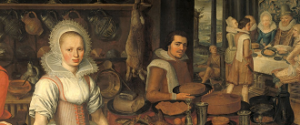
Arquivo para October 28th, 2020
Happiness in Thomas Aquinas
To analyze beatitude, which we have already explained that is also an ancient Greek theme for happiness, Thomas Aquinas learned from the Greek philosopher to distinguish between two different forms of happiness: the natural riches that are those by which man is helped to compensate for natural deficiencies such as food, drink, clothing, housing, etc., and artificial ones that do not help nature but subject it, like money, but human art invented to facilitate exchanges, so that they were like measures for venial things, and influenced by Boethius will question whether wealth is in fact the one that gives all goods:
also an ancient Greek theme for happiness, Thomas Aquinas learned from the Greek philosopher to distinguish between two different forms of happiness: the natural riches that are those by which man is helped to compensate for natural deficiencies such as food, drink, clothing, housing, etc., and artificial ones that do not help nature but subject it, like money, but human art invented to facilitate exchanges, so that they were like measures for venial things, and influenced by Boethius will question whether wealth is in fact the one that gives all goods:
“Bliss is the perfect state where all goods come together.” Now, it seems that through money you can acquire all things, because the Philosopher, in book V of Ethics, money was invented to be the guarantee of everything that man wanted to possess. Therefore, bliss consists of riches ”(Thomas Aquinas, theological suma. Part III).
Even with the possession of a broader idea of wealth, the natural wealth that Aristotle predicted, and artificial wealth as well, in none of them will Aquinate recognize it as a source of happiness, because it has no end in itself, and people who own them make it the ultimate end, it becomes a bond for something.
And what value this bond can have in itself, Tomás de Aquino examines honor, and says in this sense: “it is impossible for the beatitude to consist of honor. The honor is rendered to someone due to some excellence: and thus, it is a sign and testimony of that excellence that is in the honored one ”, it can also be the fame or glory, the power, and the goods of the body, but all these goods in themselves they also do not translate into happiness, but only false knowledge.
That is how bliss is itself, she says verbatim:” bliss is the most stable of goods “, so the lack of stability of fame occurs due to the fact that it derives exclusively from human knowledge, which, in turn, instead, it is limited, and it is often even false.
Similarly, Boethius argued: “human power cannot avoid the torment of worries, nor the sting of fear”.
As for the body, argues the Christian philosopher: “, the beatitude of man is superior in every way to that of animals, although many animals surpass men in the goods of the body”, so if beatitude comes from there, man would be equaling to animals, and how often this is true.
But what then is happiness for Doctor Angelico, who asks the same question as Boethius: “‘ Is it necessary to confess that God is the beatitude itself? ” and he will conclude that “the beatitude is the last end, towards which the human will naturally tends” and “for nothing else must the will tend as for the last end, except for God, for it must be the object of I enjoy, as Agostinho says ”(AQUINO, 2003, p. 62).
Here you can have a synthesis of what happiness is for the three great Christian thinkers of the medieval period.
For some authors, like Luiz Alberto De Boni, the philosophy of Tomás de Aquino along these lines: “the good and the end are identified”, thus has an eschatology, and if we understand that the end is just this earthly life limited to a temporal period his argument is not valid, but if we admit eternity, happiness as the ultimate good is that which we have already achieved here but which must extend beyond temporal life, outside of this, of course, only temporal pleasures.
In Picture above, by an anonymous author, The rich man and Lazarus, (around 1610, Amsterdam).
AQUINO, Tomás (2003). Theological summula. V. III. Brazil, São Paulo: Loyola.

